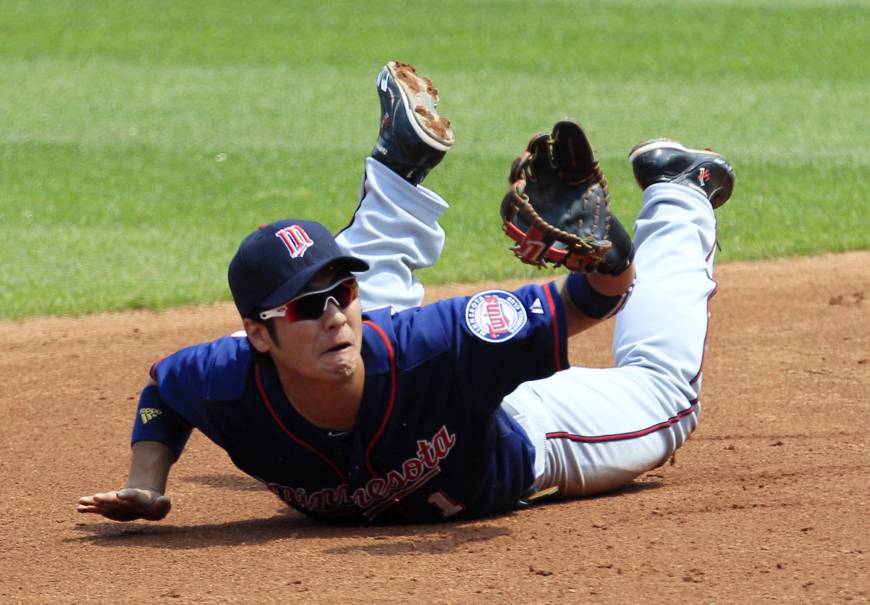New MLB slide rule may open door for Japanese infielders
The Japan Times Apr 27, 2016 Kyodo
The Japan Times Apr 27, 2016 Kyodo

Since Hideo Nomo broke open the door for Japanese stars to move abroad, not a single infielder has been among the 12 players to make a big league all-star team — although that may change in the future with the removal of one more obstacle in their path.
Moving to the majors requires Japanese players to make a mountain of adjustments. Everyone has to deal with the harder travel necessitated by playing a longer schedule in a shorter amount of time over four different time zones.
Pitchers have to contend with a different ball and batters who will look to put every mistake in the seats, with the starters working every fifth day instead of every seventh. Hitters, who are already into the prime of their careers by the time they sign abroad, have the unenviable task of suddenly adjusting to faster and — due to the ball — livelier fastballs than they have ever seen.
On top of dealing with faster pitchers, infielders also have to deal with natural grass and — until now — routine collisions at second base, which are a fairly rare occurrence in Nippon Professional Baseball.
This year, however, Major League Baseball has made it more difficult for runners to physically break up double plays at second, requiring “bona fide” slides to the bag. This change, to reduce injury, was welcomed by former big leaguer Kazuo Matsui, who holds the record for major league games played by a Japanese infielder with 630.
“The (take-out slide) has been eliminated, and I think that is big,” Matsui told Kyodo News on Sunday at Seibu Prince Dome. “Compared to the majors, Japan is not very rough. But over there, a lot of guys have gotten hurt, a lot of injuries to the knees and so on.
“That (the rule change) is a good thing, if you think about the health of the players. From the players’ perspective, it (breaking up the double play) is something you had to do in order to win. Sliding hard was a way to contribute. From my perspective, it’s complicated. I slid hard, too, but the rule change is really great for the players. This, the players’ longevity, is a big issue.”
Tadahito Iguchi, whose 493 games are second to Matsui’s, thinks the transition for Japanese infielders will always be a hard one and pointed a finger at coaching methods in Japam.
“Obviously, guys have to be really talented and practice hard if they are going to make the grade over there,” Iguchi said recently. “This will make it easier, but the standard for major league infielders is very high in terms of speed and arm strength, which is only natural since the best players in the world go there.
“A big issue is Japanese coaching, which tends to be lenient about handling the ball (on the double play).
“Japanese are taught from a young age that the proper way to field a ground ball is to get in front of it. Over there, kids learn early how to backhand the ball — and from there be thinking about the next play (and in position to throw).”
While Japanese coaches often see backhanded grabs as lazy and unsound, Matsui said they are anything but.
“There is a fundamentally sound way to backhand the ball, and anyone who knows what they are (talking) about can tell you whether a player is doing it right or not,” Matsui said. “At shortstop, for example, if you insist that a player gets in front of the ball first, a lot of runners will be safe at second because he is slow getting the ball off. So naturally, players try to backhand. But like anything, it is something you have to practice or else you can’t execute it in a game.”
Former Hiroshima Carp and Tohoku Rakuten Golden Eagles manager Marty Brown doesn’t expect the new rule to help the Asian imports much, since he predicts dangerous slides will still happen — despite the rule change that will hand the defense an automatic double play if the runner is ruled to have interfered.
“Guys will do it because 90 percent of the time those plays happen when the guy at first is going to be out anyway,” Brown said.
When the new rules were announced, New York Mets skipper Terry Collins predicted “someone will get killed” because they won’t be ready for the hard slide. This scenario played out recently in Japan, when former U.S. minor leaguer Kensuke Tanaka of Hokkaido Nippon Ham took out Fukuoka SoftBank second baseman Keizo Kawashima — a play NPB is expected to ban next year.
Yet Iguchi was heartened by the effort last year of South Korea’s Kang Jung-ho, who finished third in the National League’s Rookie of the Year voting — but whose season ironically ended in September with a fracture on a play 3 meters from the second base bag.
“I’m looking forward to more Japanese and Asians going over there and changing how Asian infielders are regarded,” said Iguchi, who was a key part of the Chicago White Sox 2005 World Series team. “Unfortunately, I didn’t do a very good job of raising the bar.”
Matsui, who was easily the Pacific League’s best player from 1997 to 2000, said he was eager for the day when Japan’s infield elite achieve proportionate success in the big leagues. But he is not holding his breath.
“We’re going to have to wait and see what happens before we really know,” Matsui said. “But I’d like to see it.”



